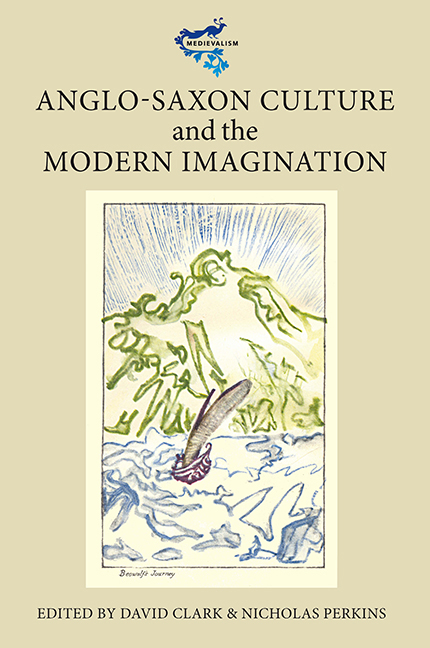Book contents
- Frontmatter
- Contents
- List of Illustrations
- Contributors
- Foreword
- Acknowledgements
- Abbreviations
- Introduction
- 1 From Heorot to Hollywood: Beowulf in its Third Millennium
- 2 Priming the Poets: The Making of Henry Sweet's Anglo-Saxon Reader
- 3 Owed to Both Sides: W.H. Auden's double debt to the literature of the North
- 4 Writing for an Anglo-Saxon Audience in the Twentieth Century: J.R.R. Tolkien's Old English Chronicles
- 5 ‘Wounded men and wounded trees’: David Jones and the Anglo-Saxon Culture Tangle
- 6 Basil Bunting, Briggflatts, Lindisfarne, and Anglo-Saxon Interlace
- 7 BOOO Seeing Beowulf in Pictures and Print
- 8 Window in the Wall: Looking for Grand Opera in John Gardner's Grendel
- 9 Re-placing Masculinity: The DC Comics Beowulf Series and its Context, 1975–6
- 10 P.D. James Reads Beowulf
- 11 Ban Welondes: Wayland Smith in Popular Culture
- 12 ‘Overlord of the M5’: The Superlative Structure of Sovereignty in Geoffrey Hill's Mercian Hymns
- 13 The Absent Anglo-Saxon Past in Ted Hughes's Elmet
- 14 Resurrecting Saxon Things: Peter Reading, ‘species decline’, and Old English Poetry
- Index
3 - Owed to Both Sides: W.H. Auden's double debt to the literature of the North
Published online by Cambridge University Press: 20 April 2017
- Frontmatter
- Contents
- List of Illustrations
- Contributors
- Foreword
- Acknowledgements
- Abbreviations
- Introduction
- 1 From Heorot to Hollywood: Beowulf in its Third Millennium
- 2 Priming the Poets: The Making of Henry Sweet's Anglo-Saxon Reader
- 3 Owed to Both Sides: W.H. Auden's double debt to the literature of the North
- 4 Writing for an Anglo-Saxon Audience in the Twentieth Century: J.R.R. Tolkien's Old English Chronicles
- 5 ‘Wounded men and wounded trees’: David Jones and the Anglo-Saxon Culture Tangle
- 6 Basil Bunting, Briggflatts, Lindisfarne, and Anglo-Saxon Interlace
- 7 BOOO Seeing Beowulf in Pictures and Print
- 8 Window in the Wall: Looking for Grand Opera in John Gardner's Grendel
- 9 Re-placing Masculinity: The DC Comics Beowulf Series and its Context, 1975–6
- 10 P.D. James Reads Beowulf
- 11 Ban Welondes: Wayland Smith in Popular Culture
- 12 ‘Overlord of the M5’: The Superlative Structure of Sovereignty in Geoffrey Hill's Mercian Hymns
- 13 The Absent Anglo-Saxon Past in Ted Hughes's Elmet
- 14 Resurrecting Saxon Things: Peter Reading, ‘species decline’, and Old English Poetry
- Index
Summary
The basic facts of W.H. Auden's life-long engagement with things Icelandic — and especially its medieval literature and myth — are well known. His father believed that the family came from Iceland, the surname ‘Auden’ being an Anglicization of the Icelandic given name ‘Auðunn’. He even toyed with the possibility that it was related to the name of the god Óðinn, and wrote to the Icelandic scholar Eiríkur Magnússon for confirmation of this; in a brief reply, Eiríkur dismissed the suggestion. But Dr Auden fostered in his son an interest in Old Norse myth — with considerable success. In Letters from Iceland, Auden writes that having listened to his father reading Icelandic folk tales to him, he now ‘know[s] more about Northern mythology than Greek’. His colouring — fair hair and a pale complexion — tended to confirm both his own and his friends’ assumptions about his Scandinavian ancestry, and he repeatedly referred to Iceland as ‘holy ground’. Towards the end of his life, in 1969, he and Paul Taylor published The Elder Edda, an English translation of selection of Old Norse verse which very largely comprises the mythological poems of the Edda.5
Just as familiar is W.H. Auden's engagement with Old English poetry. His response to J.R.R. Tolkien reciting Beowulf is very widely quoted: ‘I was spellbound. This poetry, I knew, was going to be my dish.’ But however positive his attitude to hearing Old English poetry read aloud, he did badly in his exams, and got a Third; a friend reported that he cried when he came out of his Old English paper. Nevertheless, as Chris Jones notes, he was to write in 1962 that: ‘Anglo-Saxon and Middle English poetry have been one of my strongest, most lasting influences.’ Auden's free translation of the Old English elegy The Wanderer (which begins, confusingly, with a line adapted from the early Middle English alliterative sermon Sawles Warde: ‘Doom is dark and deeper than any sea-dingle’) is perhaps his most celebrated Old English derived piece, but the pervasive influence of medieval English alliterative metre is evident throughout Auden's oeuvre.
The distinction between the two elements of Auden's double debt ought, then, to be pretty clear, Old Norse traditions providing the mythic allusions in Auden's work, and Old and Middle English metres influencing or informing his prosody.
- Type
- Chapter
- Information
- Anglo-Saxon Culture and the Modern Imagination , pp. 51 - 70Publisher: Boydell & BrewerPrint publication year: 2010

